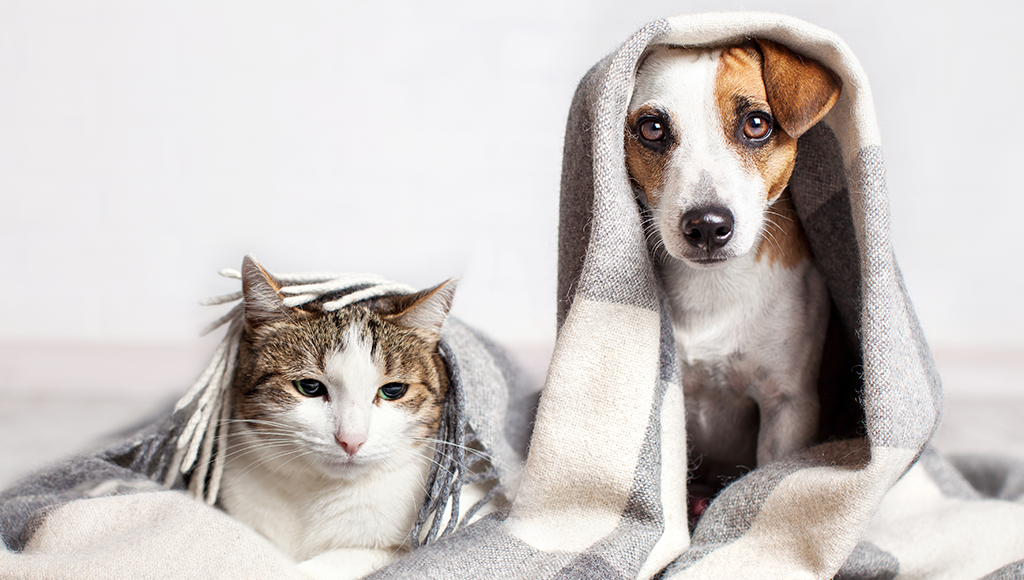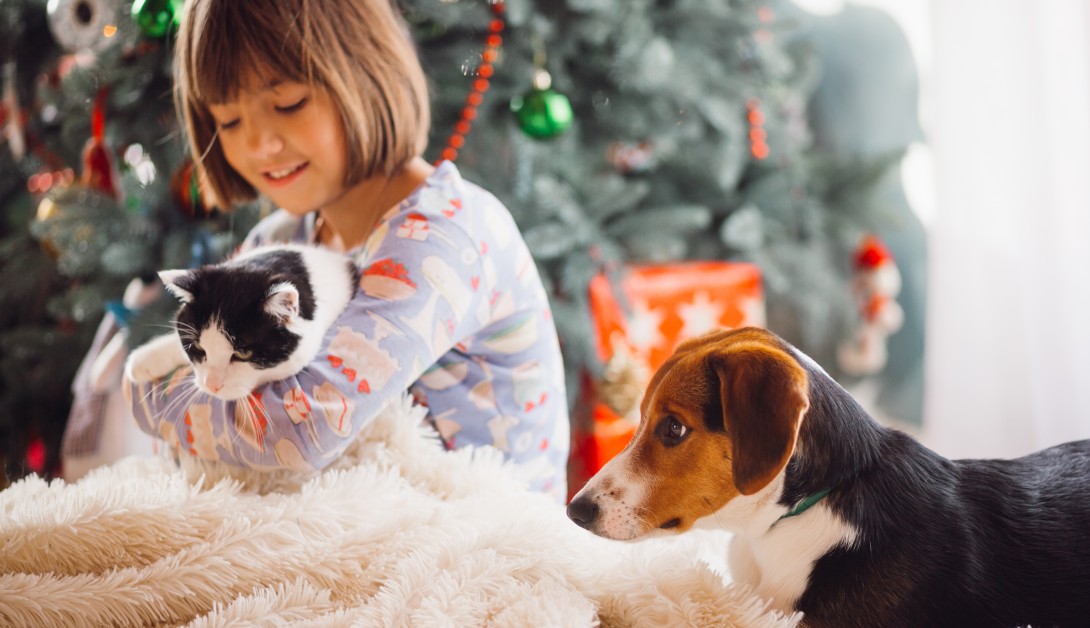Coronavirus and Pets: Is Your Cat or Dog at Risk for COVID-19?
As the threat of the new coronavirus (COVID-19) takes over the globe, you’re likely concerned about the health and safety of your entire family, including your pet. With so many misconceptions circulating on social media platforms, it’s challenging to separate fact from fiction. To help clear up any confusion about the risk of your pet contracting COVID-19 or spreading the disease, we’ve answered the top questions about how this new coronavirus affects people and their pets.

Updated April 28, 2020
What is COVID-19?
COVID-19 is a coronavirus named SARS-CoV-2. Coronaviruses are a large family of viruses capable of causing a variety of illnesses in many species, including dogs, cats, horses, birds, and people. With the potential for zoonotic transmission in some strains, coronaviruses can jump from animals to people. While coronaviruses are nothing new, COVID-19 is a novel strain that was discovered in late 2019. With COVID-19, it is thought that the virus jumped from an animal reservoir at a large seafood and live animal market in Wuhan, China, suggesting an animal-to-human spread. Since that first animal-to-human case, the virus has adapted to person-to-person transmission throughout the world, and there have been no reports of pets transmitting COVID-19 to people, although there have a few cases of animals becoming ill from COVID-19.
Can my cat or dog get COVID-19?
With the potential for animal-to-human transmission for coronaviruses, many pet owners are wondering if their furry friends can contract COVID-19. While it was originally thought that pets could not contract COVID-19, more research is coming to light and a few cases of sick animals have popped up.
Besides the two dogs who tested positive for COVID-19 in China, several tigers and lions became ill with respiratory signs, and two cats have also developed respiratory illness in the United States. Although these are only a very few animals who have become ill with COVID-19 or tested positive in relation to the vast number of infected people, it is still enough to cause concern and prompt pet owners to take proper precautions around their pets.
Can pets contract coronaviruses?
Since it now appears cats can become ill from COVID-19 and dogs can test positive without developing respiratory signs, it is obvious animals can contract coronaviruses. Pets can also develop species-specific coronaviruses that only dogs and cats can get.
In dogs, two strains of coronavirus routinely cause illness—an enteric form (CCoV) and a respiratory form (CRCoV). The enteric form is a highly contagious intestinal disease that can cause mild, sporadic signs, such as diarrhea, or none at all in healthy adult dogs. Puppies are most commonly affected and can rapidly become dehydrated from protracted diarrhea. The respiratory form is also generally mild, and has been linked to some kennel cough cases, causing coughing and other respiratory illness.
Cats can also develop an enteric coronavirus form specific to felines (FCoV). While most cases usually involve self-limiting, mild diarrhea, in rare instances, this coronavirus strain can mutate to cause feline infectious peritonitis, an almost always fatal disease.
Keep in mind that the human coronavirus, COVID-19, and the coronaviruses found in dogs and cats are completely different strains. COVID-19 is a betacoronavirus, while the coronaviruses in your pet are alphacoronaviruses. But, viruses are excellent at adapting and mutating to infect different species, so more ongoing research is needed to completely understand the full capabilities of COVID-19.
What does the current research show about the effects of COVID-19 on animals?
Since COVID-19 is thought to have developed in bats, there is great concern about its zoonotic potential for animals in close contact with people. As of April 26, 2020, there have been several reported cases of animals testing positive and developing respiratory illness signs associated with COVID-19. An early study has been performed at the Harbin Veterinary Research Institute (HVRI) of the Chinese Academy of Agricultural Sciences. This study investigated the susceptibility of several domestic animal species to SARS-CoV-2 infection, as well as transmission between members of these species. Based on the study results, the authors have formed the following conclusions:
- Ferrets and cats appear highly susceptible to infection with the novel coronavirus.
- SARS-CoV-2 can replicate in the upper respiratory tract of ferrets for up to eight days.
- Respiratory droplet transmission of the virus between cats is possible.
- Dogs appear to have low susceptibility to the virus, and intraspecies transmission is not likely.
- Pigs, ducks and chickens do not appear to be susceptible to the virus.
When interpreting these results, keep in mind that the sample size was small, there was no control group, and the test animals were inoculated with a high viral load in a laboratory setting, so take caution when applying these findings to wider populations of pets.
Out of the species tested, it appears cats and ferrets are the most susceptible to COVID-19, so extra care should be taken around these household pets if you are ill.
Should I have my pet tested for COVID-19?
You may have heard of two dogs testing positive for COVID-19 in China and the ill tigers, lions, and cats, and worry about your own pet. These two dogs had positive nasal and oral samples for COVID-19, but negative fecal and rectal samples. This suggests the dogs may have been infected with small amounts of the virus, but were not infectious and incapable of transmitting the disease. Since the initial positive test, both dogs have tested negative, and neither developed respiratory symptoms.
Regarding feline COVID-19 victims, cats appear to become infected with mild respiratory signs after being in contact with an infected person, such as a sick zookeeper for the large cats, and a sick owner for one of the house cats. If you are sick and your pet develops respiratory illness signs, contact your veterinarian and explain the situation. Tests to detect COVID-19 in pets have been developed for general practice use in potential transmission conditions.
In addition to the information gleaned from these two pets, a major veterinary diagnostic laboratory has released the results of its study of thousands of canine and feline samples. Out of the samples tested for COVID-19, not a single positive result was obtained. Based on the current data, leading health officials do not believe testing pets for COVID-19 is a necessity at this time.
How can I ensure my pet does not spread COVID-19?
Although your pet may not become ill from COVID-19 and not be a suitable host for an active infection, she may be able to spread the virus through indirect contact. The primary method of COVID-19 transmission is through direct person-to-person contact with infective respiratory droplets emitted by coughing or sneezing, but a secondary method can occur through indirect contact with contaminated surfaces. A study published in the New England Journal of Medicine proved the theory that smooth surfaces remain contaminated with viable viral particles for a longer period than porous surfaces. For example, countertops, door handles, and light switches can hold the virus for several hours to days, and infect the next person who touches the object. Fibrous materials, such as pet fur, money, and paper are more likely to trap the virus particles deep within, reducing the potential for transmission.
Despite the limited potential for transmission through contact with your pet, the Centers for Disease Control and Prevention (CDC) and the World Health Organization (WHO) recommend acting out of an abundance of precaution around pets.
If you have been diagnosed with COVID-19, these health organizations advise limiting contact with your pet, and ideally have someone else care for her. If that is not possible, wash your hands before and after handling your pet, and avoid kissing, hugging, snuggling, or sharing food with your four-legged friend. Wash your pet thoroughly in soap and water if you sneeze or cough nearby, but avoid the use of bleach or other disinfectants on your furry friend. Essentially, take the same precautions around your pet as you would around another person if you are infected with COVID-19 to avoid turning your pet into a fomite, or carrier of virus particles.
Since cats can also be infected and develop illness from COVID-19, take special preventive measures around your cat if you are ill. Fortunately, cats do appear to be terminal hosts at this time, and the virus does not seem able to pass to another animal or person if a cat becomes infected. Although dogs do not appear to be affected in the same manner as cats, take the same precautions to ensure the virus does not continue to evolve and mutate to infect more species.
What should I do if my pet becomes sick after being around someone with COVID-19?
While there have been very few reported cases of pets becoming ill from COVID-19, there is too much that is simply unknown about this virus. It may mutate and infect pets in a more widespread fashion in the future, so vigilance is necessary to ensure your pet remains healthy. If your pet develops any respiratory signs, such as coughing, shortness of breath, sneezing, or nasal discharge after being in contact with a sick person, contact your veterinarian. During your pet’s appointment, your veterinarian will rule out more common conditions responsible for respiratory illness, such as heartworm disease, asthma, a collapsing trachea, heart failure, upper respiratory infections, kennel cough, or allergies. It’s unlikely your pet will become ill from COVID-19, but it’s better to be safe than sorry.
How should I prepare for a quarantine situation with my pet?
If your state governor issues a stay-at-home protocol to minimize disease transmission, ensure you are prepared for a quarantine situation with your pet. Stock up on two to four weeks of supplies, including food, treats, litter, and medications. Many veterinary hospitals have online pharmacies that will ship your pet’s prescriptions directly to your door, or they may offer additional refills to ensure your pet does not run out.
While stuck indoors, your dog may experience cabin fever without the opportunity to visit the dog park or local pet store. Keep your pet entertained with mentally stimulating activities, such as feeding from treat puzzles, training new skills, and creating indoor agility courses. For cats, offer more vertical space, such as climbing towers, or position a perch near a window so your cat can birdwatch with you.
If your pet needs veterinary care at any point, contact your veterinarian for their updated protocols designed to keep your pet and community safe. Otherwise, consider rescheduling wellness vaccination visits and elective procedures until after this pandemic has resolved.
How can I stay informed about the latest information on COVID-19?
During these troubling times, fear of the unknown can create excessive, unnecessary worry about the health of your beloved pet. Stay informed with reputable sources as they update their websites with the latest COVID-19 research. Leading animal and human health organizations that offer accurate information regarding COVID-19 include:
World Health Organization (WHO)
Centers for Disease Control and Prevention (CDC)
American Veterinary Medical Association (AVMA)
World Organization for Animal Health (OIE)
For more information about your pet’s specific health status and the effects COVID-19 may have, contact your veterinarian for advice. As more information comes to light about this novel coronavirus through extensive research, pet-care guidelines may change. By staying informed with current, accurate knowledge, you can keep your pet and your family safe and healthy.
Additional Resources:
https://wsava.org/wp-content/uploads/2020/03/COVID-19_WSAVA-Advisory-Document-Mar-19-2020.pdf
https://www.lifelearn.com/2020/03/03/coronavirus-and-your-pet/
https://www.dvm360.com/view/early-study-results-show-cats,-ferrets-susceptible-to-covid-19
Ready to start saving money on pet wellness care?
Then take a look at Mint Wellness, the pet wellness plan that provides fast reimbursement on routine pet care. Save on vaccinations, wellness exams, preventatives, dental, and more!
Learn More


